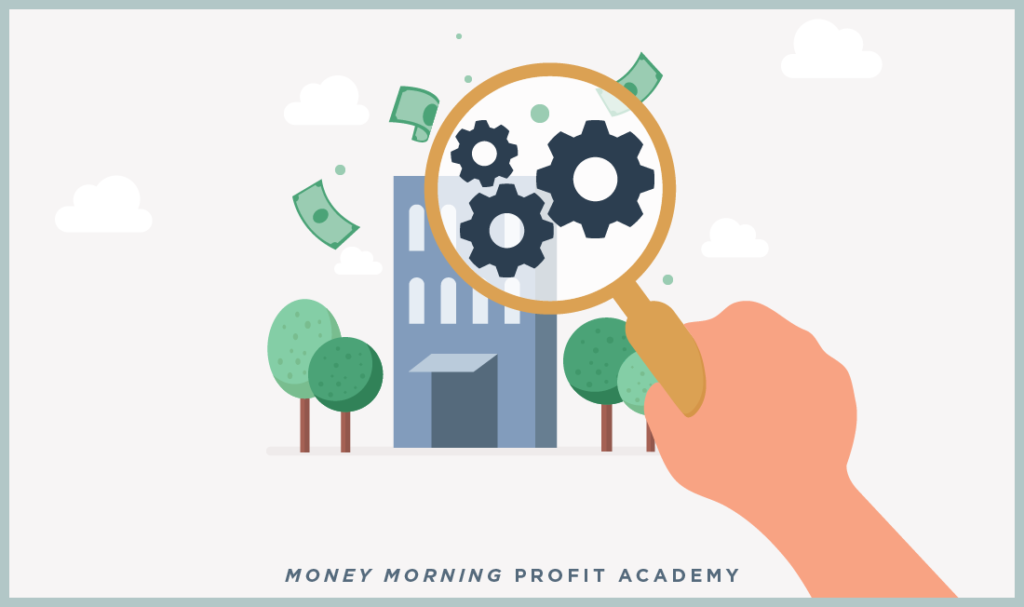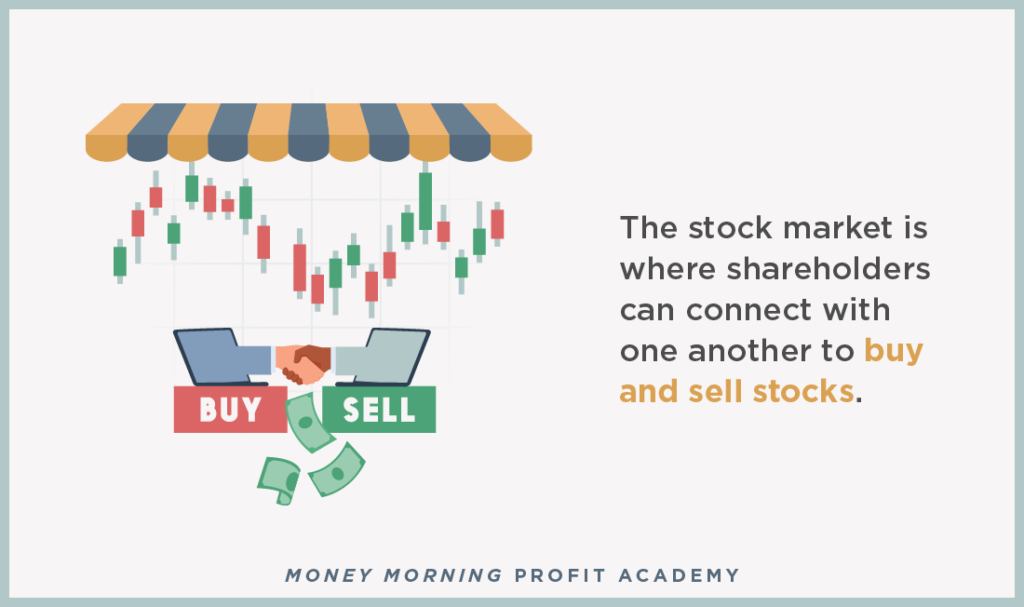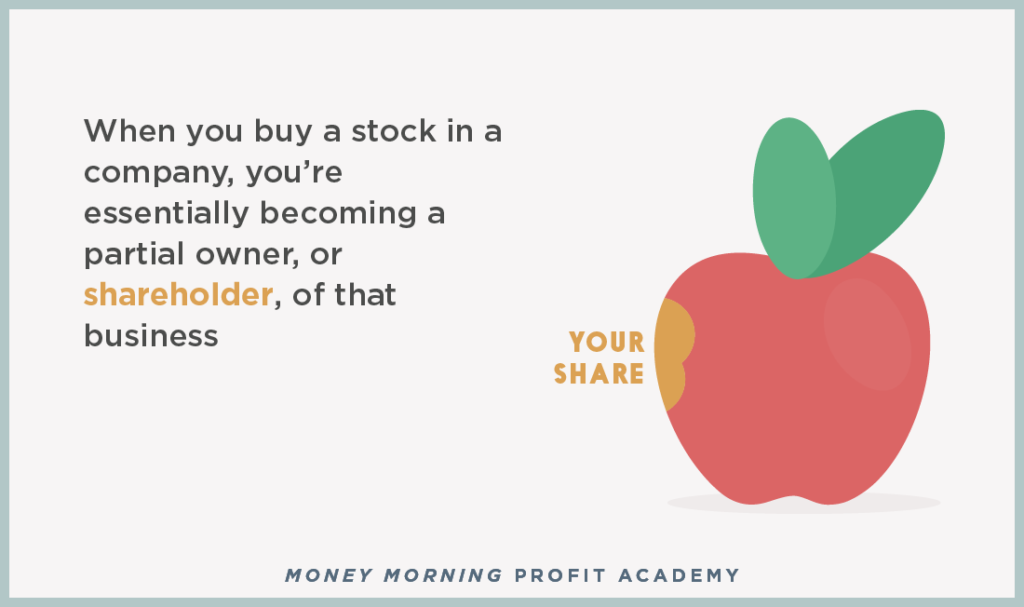
Now that we’ve covered why you should be investing in the stock market, we’re going to show you how you can start doing it – and make a profit! From defining what a stock is down to the finer details of the market, this article is designed to bring you up to speed no matter wherever you are in your stock investing journey. To get started, we’ll begin with the basics of the stock market and later develop an understanding of how it works. After this lesson, you’ll be ready to talk stocks like a pro.
Getting Started: What Is the Stock Market?
In order to start buying and selling shares in the stock market, you must first understand what the stock market is. Simply put, the stock market is where shareholders can connect with one another to buy and sell stocks. More specifically, when stockholders buy or sell their shares, they do so on public exchanges, or marketplaces, that uphold specific rules and regulations for trading. These exchanges include public markets like the New York Stock Exchange (NYSE), the Nasdaq exchange, Chicago Board Options Exchange (CBOE), plus other exchanges all across the world. These marketplaces are what we call the stock market.

What Is a Stock?
If you find yourself wondering how stocks work or what a stock is, you’re not alone! In layman's terms, a stock is simply a stake in a business. Each publicly-traded company is divided up into thousands (or even millions) of equally sized shares or stocks with each representing a portion of ownership within the company. Each business is also assigned an abbreviation (stock symbol) so both investors in the market and other observers can quickly and easily identify which stock is associated with which business. These labels are called ticker symbols and typically consist of a few letters typed entirely in uppercase. You’ve likely seen these all-caps labels streaming across the bottom of a news program or in the newspaper’s business section. For instance, Microsoft Corp. trades under the ticker symbol, MSFT. But, keep in mind that not every ticker symbol flashing on the trading screen in a stock represents a publicly-traded company. There are also several other types of securities you can trade alongside stocks including mutual funds, exchange-traded funds (ETFs), real estate investment trusts (REITs), corporate and government bonds, and even contracts, like futures and options. While many of these securities trade just like stocks, they work a bit differently.
Mutual Funds
To better understand mutual funds and how they work, imagine buying a basket filled with shares. These shares are from various types of companies and securities. And with your single purchase, you gain access to a diversified selection of stocks from an assortment of companies in return. Mutual funds are typically managed by a professional who works for a bank or investment and chosen by buyers who have specific goals such as expedited growth, stability, retirement, or a combination of financial goals. Since an investing professional actively manages these funds, buyers who wish to partake in these investments are also charged a management fee on top of the investment cost.
Exchange-Traded Funds (ETFs)
Exchange-traded funds are quite similar to mutual funds. In fact, ETFs are a type of mutual fund and share most of the same qualities with one key exception: like a normal stock, ETFs can be traded at any point throughout the day. This perk can be particularly beneficial for those who value liquidity. Additionally, ETFs are passively managed, making the fees much lower compared to a normal mutual fund. In terms of functionality, ETFs try to match a particular stock index, like the Dow Jones Industrial Average, by filling their basket with proportionate shares of each stock in the index. Owning an ETF is an easy way to match the market’s average return.
Real Estate Investment Trusts (REITs)
Beyond mutual funds and ETFs are real estate investment trusts. REITs have recently picked up in popularity and are chosen by those who look to purchase shares in larger real estate companies, just as stock buyers would purchase shares in a business. There are a number of real estate businesses that are considered REITs, which own or operate entities such as hotels, apartments, warehouses, and more. Similar to mutual funds, REITs are incredibly diversified and valued for their liquidity. Depending on your investment goals, REITs may be a great addition to your portfolio.
How Does the Stock Market Work?
When learning how stocks work, it’s important to remember that investing in stocks isn’t as simple as buying a ticker you like and waiting for the price to go up. When you buy stock in a company, you’re essentially becoming a partial owner (shareholder) of that particular business. And, as a partial owner (no matter how large or small your role), you want ownership in strong, profitable companies that are projected to continue making money. This point is crucial as you continue on your investing journey for one main reason: Businesses that make money will make you money. In fact, shareholders – those who own the company’s stock – make some of the biggest decisions about the company, just like the owners of small, local businesses.

Once you own shares of a company, you can be sent details on the company's annual meetings and may even get to vote on company business. With your shares, you may be able to participate in decisions from who gets appointed to the board of directors, to executive compensation, to which accounting firm the company should hire. Your role with the company is tied closely to the number of shares you own. Plus, some stable and profitable companies reward their shareholders with dividends. These are payments from traded companies made to shareholders, but it’s important to note that not all businesses pay dividends. These can be paid quarterly or under certain circumstances such as a company selling off a major asset.
Why Do Companies Issue Shares?
To fully understand how the stock market works, let’s take a closer look at the businesses that issue shares. Publicly traded companies participate in the stock market for a number of reasons that all benefit the health and wellbeing of the business. For example, a smaller company that’s proven initial success and is looking to grow will likely need some sort of outside financial support in order to do so. And rather than turning to traditional lenders, larger banks, or even alternative lending providers for working capital, some businesses are in the position to sell shares of their business. As such, investors like you can opt to purchase shares of the company which in turn provides the business with capital. After a business transitions to a publicly-traded company, their shares may increase in demand, making their move into the stock market profitable.
The Relationship Between Buyers and Sellers
Once you’re in the position to begin buying and selling shares across the market, you’ll want to be sure you understand the relationship between buyers and sellers. The stock market can move quickly, and the best way to stay ahead of the game is to develop a solid understanding of the core transactions. To help simplify the stock market, it may be helpful to picture it as an auction. In this scenario, you have a variety of items (or shares) up for grabs. Depending on how popular the particular item may be, the price can fluctuate dramatically. The more popular something is, the bigger the price tag people are willing to pay. On the other hand, lower demand for an auction item will result in a cheaper price. In terms of trading in the stock market, keep the following in mind:
- For buyers: Aim to purchase stocks at the lowest price possible before popularity sets in and drives up the cost.
- For sellers: Sell your shares when you’ll make the most money off of them before the demand dwindles.
Because stocks are bought and sold on a public market, the share price, or price of the stock, rises when more people want to own the company, and falls when fewer people are interested. It’s no surprise that businesses with growing profits who are developing the latest tech breakthrough or are dominating their market often see their share prices rise over time. People want to own those companies and they’re willing to pay more money for them. Whether you’re buying or selling, do your best to stay vigilant and anticipate trends – specifically paying close attention to which shares may be the best stocks to buy. Your watchfulness can pay off if done well.
Entering the Stock Market and Putting Your Knowledge to the Test
Owning the best companies with the highest potential to gain value over time is the trick to successful investing. But, while you’ve mastered what the stock market is, there’s still plenty more to cover! Continue your learning with more tips on how to make your investments successful with additional lessons about the stock market from Money Morning.


